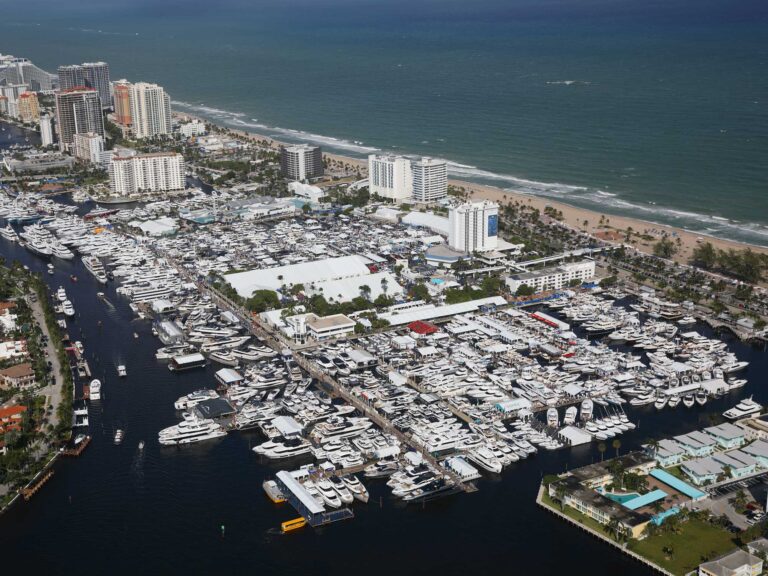
With possession of small amounts of marijuana now legal in eight states, boaters are asking whether the U.S. Coast Guard, a federal agency, will abide by those state laws.
The answer is a resounding no. In six coastal states where marijuana possession is legal, “It remains a violation of federal law. If we encounter it in the course of our operations, we will enforce those laws,” says Lt. Cmdr. Devon Brennan, who oversees the U.S. Coast Guard’s counter-narcotics enforcement programs and policies. Understanding that position is critical for boaters concerned about guests bringing it aboard, thinking it is OK.
When I began charter fishing in Florida during the 1980s, marijuana smuggling was so rampant that every school kid understood that square grouper was the nickname for a floating bale of weed. The official policy back then was zero tolerance: A single marijuana seed, even in a public space aboard a charter vessel, would mandate vessel seizure, resulting in 113 boats confiscated under the policy just in 1988. Federal authorities attenuated that policy for discovery of small quantities in 1989.
In most states today, possession of less than an ounce of cannabis garners a citation and a few-hundred-dollar fine, and recreational use is now legal in Alaska, Washington, Oregon, California, Nevada, Colorado, Maine and Massachusetts. It’s ironic then that significant problems from cannabis aboard boats occur in seven of those eight states where it is legal. (Because it enables commerce between California and Nevada, Lake Tahoe falls under Coast Guard authority. Only Colorado is devoid of Coast Guard presence.)
Brennan points out that the Coast Guard is not unique. Any federal law-enforcement agency follows federal law. The difference is that on land, federal officers aren’t out writing tickets for faulty taillights, but the Coast Guard routinely boards boats, even within state waters, to enforce federal boating-safety laws. While they’re inspecting flares or looking in the PFD locker, if they find a baggie with a little weed, it becomes a big problem. In states where laws prohibit marijuana possession, the Coast Guard routinely passes cases to state authorities. But boaters busted within, say, Massachusetts waters, will face federal prosecution.

Operation Dry Water
Federal law covering small quantities of any Schedule I substance, including marijuana, allows fines as high as $5,000. “We don’t specify an amount [of marijuana],” Brennan says. Instead, circumstances are weighed to determine possession versus “intent to distribute.” First-time offenders can expect marijuana-possession fines similar to state levels, as determined by a Coast Guard civil penalty hearing officer. “Fifty pounds [of marijuana] is where we get into trafficking level,” Brennan adds.
That record of a federal narcotics violation carries other consequences too. Anyone holding a U.S. Coast Guard captain’s license, for example, even if they were out boating for fun on the day of the marijuana citation, will have to wait at least a year after conviction to renew that license and also complete a drug rehabilitation program, among other requirements. (The same holds true for state drug-possession violations.)
State boundaries on the water aren’t defined by welcome signs either. Consider New Hampshire’s 13-mile coastline sandwiched between pot-legal Maine and Massachusetts. As of this article’s writing, simple marijuana possession still carries up to a $2,000 fine and a year in jail. New Hampshire’s decriminalization effort seems as though it will eventually settle at a $500 fine for possession of less than one-quarter ounce, even though Massachusetts’s recreational-use cutoff is 1 ounce and Maine’s is 2.5 ounces.
Operating under the influence of a controlled substance is the paramount concern of all law-enforcement personnel who I interviewed. “Legalization [of marijuana] has driven us to take a hard look at our OUI program,” Brennan says, which now includes oral fluid collection. “A Standardized Field Sobriety Test determines impairment. The oral fluids tell us what that impairment is caused by.”
OUI might cost more than fines and legal fees too. Insurance policies may not be renewed, or possibly even cancelled, after an OUI conviction. “Review the policy and make sure you fully understand its coverages. Contact your agent or insurer and ask questions,” says Scott Croft, vice president of public affairs for BoatU.S.
“Unlike home or auto policies, boat-insurance coverage can vary significantly.”
While laws vary, it’s clear that marijuana aboard can cause trouble for boaters cruising waters patrolled by federal agencies like the U.S. Coast Guard.

The Dangers of Boating Under the Influence
Your Brain on Drugs
Dr. Marilyn Huestis, adjunct professor at the University of Maryland medical school, is a leading researcher on cannabis impairment, including studies employing University of Iowa’s advanced driving simulator. Simple tasks, she says, are often completed just as well while impaired, but performance drops rapidly when complexity increases. Divided attention — juggling multiple tasks at once — is particularly hampered by marijuana use. “You tend to see [or notice] things later, react slower and have trouble reacting in difficult situations,” she adds — all are impedances to safely operating a boat.
Huestis says research indicates as much as a 2.6-fold increase in the odds of being in a serious or fatal automobile accident with any measurable THC in blood, and studies have shown as high as 6.6 times the serious accident rate at 5 nanograms of THC per milliliter of blood, which is Washington State’s legal limit. Huestis says being legally drunk is as bad or worse for driving than being high, but she asks, “Why would you want to more than double your risk of a major accident or fatality?”
Motor control is also diminished. “Your brain sees an apple, tells your hand to reach out, wrap your fingers around it, and bring it to your mouth. That [process] is tremendously affected by cannabis,” she says. As a boater herself, Huestis sees significant implications while docking, for example. Besides physiological effects while high, marijuana withdrawal also leads to acute tiredness, compounding the effects of fatigue common after a day on the water.
One way marijuana use differs significantly from drinking alcohol is that THC concentrations measured in blood decreases by 90 percent after less than 90 minutes, largely because the brain and major organs absorb it, Huestis says. The feeling of being high returns to baseline in three to six hours, but the effects on driving may continue past eight hours for occasional users — those who use marijuana less than daily.
For those who light up at least once per day, termed “chronic frequent users,” Huestis could measure THC in their blood, and even their sweat, 30 days after last use, and her studies still showed significant psycho-motor impairment after three weeks of pot abstinence.
Another troubling issue, she says, is studies showing marijuana users’ willingness to drive. “People don’t think cannabis is impairing them, even when it is still at least twice as likely to result in an accident,” she says.









